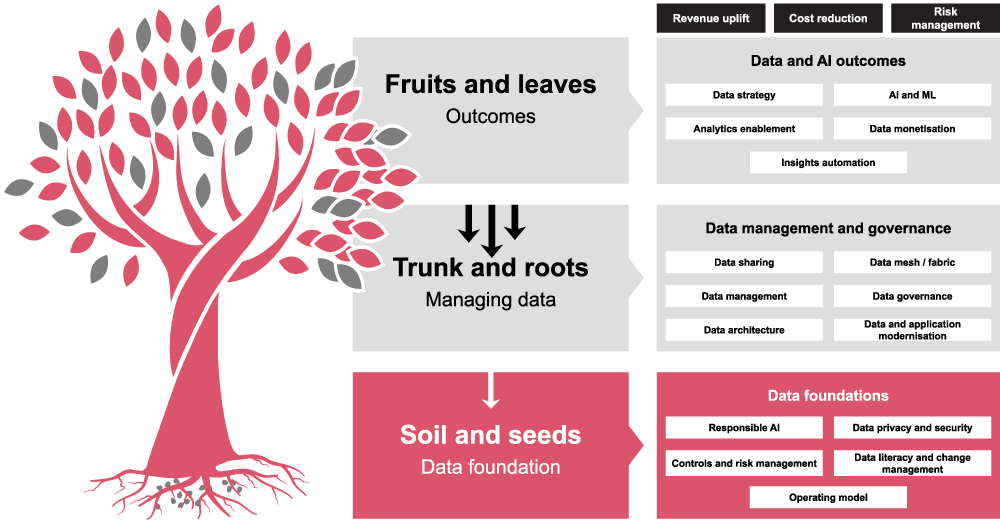{{item.title}}
{{item.text}}

{{item.text}}
As your organisation marches towards becoming more data-driven, setting up the right foundational elements while managing risks and establishing trust goes a long way in achieving sustainable outcomes.
We help you truly harness the power of your data, and make it
PwC’s data and analytics professionals can help you optimise your investments, enabling you to provide integrated, trusted and timely data upon which various analytics initiatives can be built upon.
98% of business leaders have some plans to make their AI responsible but even though nearly every company has responsible AI ambitions, fewer than half are planning action. (PwC 2022 AI Business Survey)
Given the widespread understanding of responsible AI’s urgency, the lack of action likely reflects the challenges. Responsible AI requires both technology and business experience. The potential risks of inadequately managing AI solutions are multi-faceted, including performance, ethical, security economic, governance and societal risks.
Our Responsible AI Toolkit is a suite of customisable frameworks, tools and processes designed to help you harness the power of AI in an ethical and responsible manner - from strategy through execution.
Today’s enterprises are digitally powered and decision making across all levels of the organisation is driven by data. As data collection, storage and analysis become more complex through growing volume, variety and velocity, organisations need to ensure proper data management and governance practices to protect the privacy of sensitive information.
Learn more about how we can help you with privacy assessment
Enterprises are being exposed to an expanding threat landscape with regards to data. It is borne out of the sheer volume of data generated, shared and consumed for a variety of purposes, from customer experience to third-party relationships, to regulations. Therefore, it is important to safeguard your data assets via controls executed via policies as well as technologies.
Modern organizations need actionable insights generated from the data, to drive tangible business outcomes. Therefore, employees need to be data literate, i.e., understand data and communicate insights effectively.
But driving data literacy and adoption to analytics initiatives is full of impediments. 87% of data science projects never make it to production, as per a survey by VentureBeat. Resistance to change – a part of human nature – is one of the main reasons for it. This human side of data and analytics is often underestimated or overlooked by data leaders. This is where we think we can bring in the multi-disciplinary expertise to help you drive outcomes.
We bring to the table the following:
Large enterprises typically have to deal with multiple data and analytics initiatives involving different vendors, products and processes. Hence, they face challenges in figuring out the right operating rhythm – essentially how the whole system will work as per the data strategy, in ultimately delivering value from data. This misalignment affects the day-to-day actions of individual employees and ultimately creates an insurmountable gap between strategy and execution.
A target operating model (TOM) helps in translating a robust data strategy to operationalisation for tangible business outcomes effectively. It determines the roles, workflows and process design, IT decisions, and investment decisions which are needed for the right execution of data strategy. We’ll help you in building a strategically aligned, “fit for purpose” target operating model to ensure success of your data strategy.
{{item.text}}

{{item.text}}


